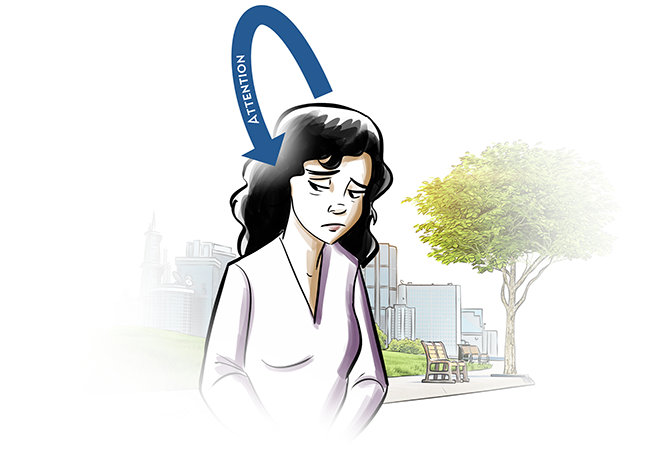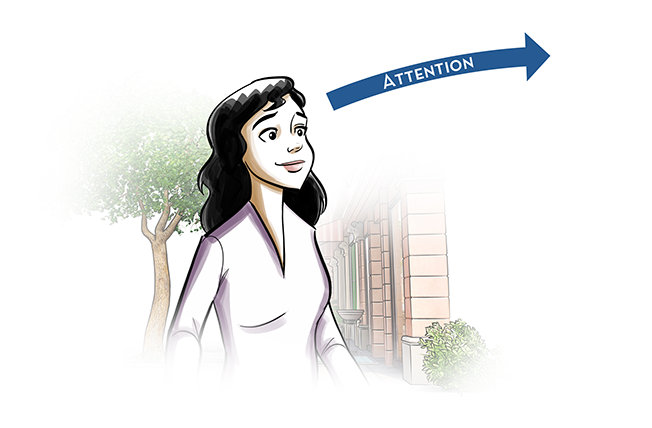Extroversion and Introversion
Introversion means looking in too closely.

Extroversion means being able to look outward.

An extroverted person is someone who is capable of looking around the area in which he lives or works. An introverted person is only capable of looking inward at himself.
A person who is capable of looking at the world around him and seeing it quite real and quite bright is, of course, in a state of extroversion. In other words, he can “look out.” He can also work. He can see things that need to be handled and handle and control those things which he has to handle and control. At the same time, he can choose to stand and watch those things which he does not have to control and be interested in them.
The person who is introverted is a person who has probably already passed exhaustion some time earlier. He has had his attention on himself (his attention is on old injuries which are still able to make him feel bad). This can go on and on until the person is always looking inward and not outward. He is avoiding having to look at solid objects around him like the walls, floor, desks, cars, etc. The people and things around him seem to him to not be real.
Now let us take the actual subject of work. Work is the application of attention and action to people or objects located in space.
When someone is no longer able to directly look at people or objects or the space in which he is located, he begins to have a “lost” feeling. It is as if he is walking around in a sort of mist or very light fog. Things are not real to him and he is not able to control the things around him. He has accidents, he has bad luck, and he has things turn against him simply because he is not handling them or controlling them or even observing them correctly. The future to such a person seems very bad—so bad sometimes that he cannot face it. This person could be said to be severely introverted.
In work, the introverted person’s attention is stuck on objects which are usually, at the most, only a few feet from him. He pays his closest attention to things which are within the reach of his hands, such as pens, books, computers, cell phones, etc. This puts his attention away from extroversion and makes him now look at some spot close to the front of his face. His attention gets stuck. If the things he is working with are similar to some old injury or operation, he is likely to remember some past bad memory—he then gets the pains and ills and the feeling of tiredness or hopelessness which he had during that moment of injury. As his attention is continuously stuck in this area of his life, he often then starts to look only at the earlier accidents and bad times he experienced, even when he is not working.
Let us take someone who works as an accountant for a company. He is constantly looking at books and computers and pieces of paper at fixed distances from his eyes. After a while, he can see only things close to him and needs glasses to see farther. His eyes most easily fix on a certain point of distance. Then, as he fixes his attention there, he starts to withdraw even from that point until, after a while, his focus does not even quite reach his own computer screen. He has to get a stronger pair of glasses so that he can see the computer screen more clearly. His vision and his attention are much the same thing—both poor and getting weaker.
A person who works with a machine or computer or books or objects that are always at a fixed distance from him leaves his work and tries to keep his attention fixed exactly where his work was. In other words, his attention never really leaves his work at all. Although he goes home, he is still really “sitting in the office.” His attention is still fixed on the area of his work. Again, if the area where he was working and his home are similar to some injury or accident (and who does not have one of these, at least?) he begins to feel weak or tired.
Is there a cure for this? Only a trained Scientologist could clear up this difficulty entirely, but the worker does have something which he can do.
Regardless of whether you are a person in charge of money, or a clerk, or an executive or a person who operates a machine, the wrong thing to do is to leave work, go home, sit down and fix your attention on an object more or less at the same distance from the one you look at continually at work.
In the case of a foreman in charge of a gang of men in a workshop, for example, who is continually talking to men at a certain distance away from him and giving them orders to do things, the wrong thing for him to do is to go home and talk to his wife at this same distance. The next thing she knows, she will be getting orders just as if she was a member of his workshop!
Even worse is to go home and sit down and read a paper, eat some dinner and go to bed. If a man practiced the pattern of working all day and then sitting down “to rest” with a book or a newspaper in the evening, it is certain that, sooner or later, he would start to feel quite exhausted. And then, after a while, he would fall even below that and would not even wonder at his unwillingness to do things which were once very easy to him.
Is there a right thing to do? Yes, there is. A person who has his attention continually fixed upon some object or at some distance from his eyes during work should fix his attention somewhere different after working hours.

